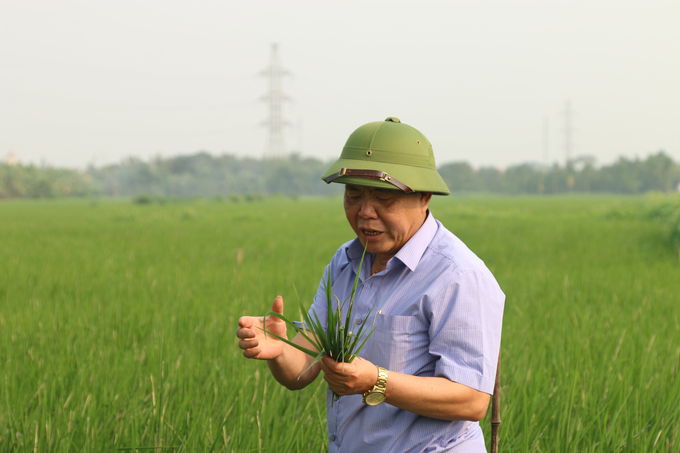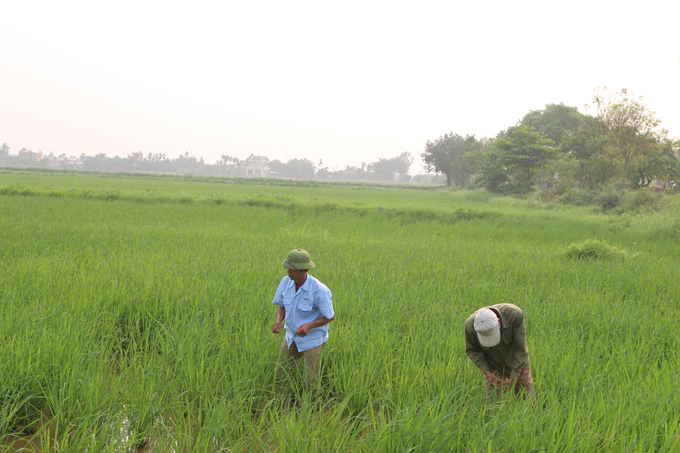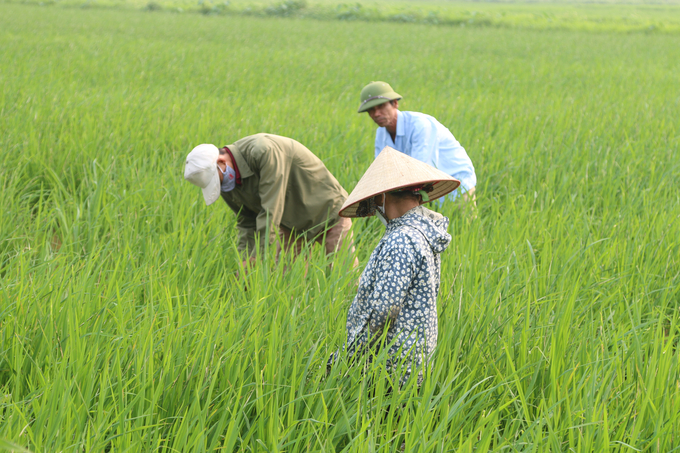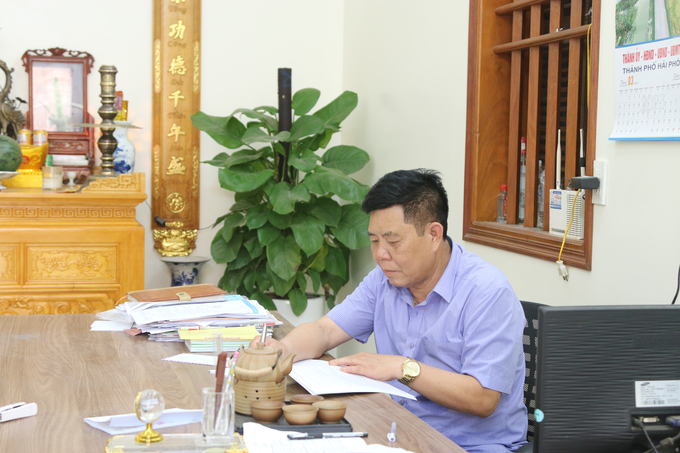Determined to “revive” the wasteland.
Not the only one, but Mr. Bui Xuan Son, born in 1962, resident of Hamlet 3, Bac Son Township, is a rare person in An Duong District (Hai Phong) who dares to give up personal material interests, rice and money with the fields to roll, with farming to overcome deserted fields situation.
As the breadwinner of a family of 6, Mr. Sohn worked as a village headman for 15 years, then retired and worked as a branch manager for a company with a salary of up to VND40 million. The period when Mr. Sohn retired as village chief was also the period when his home fields were largely deserted, sometimes by as much as hundreds of hectares.

Mr. Bui Xuan Son, head of Village 3, Bac Son Township, An Duong District. Picture: Dinh Muoi.
After being ‘persuaded’ to return as village head and elected party cell secretary, the rehabilitation of abandoned fields in Bac Son parish has started to thrive.
“One hundred mulberries water silkworm heads,” when Mr. Son took office as the village head one day, Mr. Son received instructions from the Bac Son Municipal People’s Committee to rehabilitate the area of the abandoned rice land, this is also the decision of the Municipal Party Committee for a long time, but the implementation is tangled like silk.
At present, the total area of abandoned agricultural land in An Duong District is about 600 hectares. Recently, the area of abandoned fields has been actively restored by the communities.
With a solid reputation and a passion for the field, Mr. Son put everything aside including his family to focus on propagating and mobilizing people to return and renovate the wasteland to grow rice.
“The work of overcoming the abandoned land in Village 3, Bac Son Township is very difficult. The whole village had almost 35 ha of agricultural land, at that time only over 3 ha had been converted for growing vegetables, fruit trees and ornamental plants, the rest had been abandoned since 2017,” remembers Mr. Sohn.
According to Mr. Son, the main cause of people abandoning their fields is that some areas in the foothills of the fields are low-lying, low-lying or flooded in the rainy season, the fields are far from residential areas, and the production costs are high when profits are low.
Industrial zones and clusters with hundreds of enterprises put into operation have created many jobs, attracting thousands of workers with stable incomes averaging VND 5-7 million/month, while income from rice production is very low when it is cheap is, it’s only about 200,000 VND/sao.
On the other hand, small fields have many limitations in terms of technical infrastructure, difficult cultivation, high production costs, low labor force, insecurity, weather dependency… Therefore, farmers are no longer salty, but with cultivation.

Many households have returned to rice cultivation rather than giving up since Mr. Son’s campaign. Picture: Dinh Muoi.
Mr. Sohn, having caught the “disease”, drew up a plan to accumulate land, to create conditions for the application of science and technology, and to mechanize all stages of production synchronously. The whole village 3 had 285 households with fields at that time, Mr. Sohn went to every house to speak and sent opinion sheets to every household. Not surprisingly, 95% of households that did not grow rice initially wanted to lease or borrow the field to transplant to the village.
“Agricultural production, or especially rice cultivation under the condition that the land is small and fragmented, so the efficiency is not high, is the main reason why farmers have to give up their fields,” Mr. Son confided.
Unafraid of trouble, Mr. Sohn continued to take science and technology transfer training courses on agricultural production to improve his production level and had little “capital” to talk to people.
Working during the day, he went from house to house in the evening to propagate and mobilize people to renovate the wasteland to plant rice, but everything was hampered by the fact that the households had abandoned their fields and had not produced for many years. Mr. Sohn went to each household to present his desire to borrow the field for production. The community leaders expressly agree to this, and the people also agree. All procedures for renting and borrowing land are facilitated by the government and the people.

On the improved farmland, needy people can register and participate in rice cultivation in an area larger than the family’s field. Picture: Dinh Muoi.
“It is not clear how in a short period of time Mr. Son borrowed from villagers in Village 3 up to 26 ha of abandoned fields in 4 years to renovate and plant rice. This has helped the local “wild field revitalization” movement to get off to a promising start,” said Mr. Vu Doan Bach, Chairman of the Bac Son Municipality People’s Committee.
Bring farmers back to rice
After borrowing 26 ha, Mr. Sohn started the renovation. Since the field has been abandoned for many years, it is necessary to spend a lot of money on demolishing the land, renovating and strengthening the territory, treating weeds, facilitating the mechanization of production, care and pest control.
Although he could not mobilize all households to participate, Mr. Sohn is still determined to overcome 26ha of uncultivated fields by mobilizing the number of households who want to transplant to get involved in field renovation, wild weed removal, digging of canals, and renovating the inland road fields.
Over the months, people in the community have seen the fields dammed, paved and over 5,000m of canals and dirt roads dug. Mr. Son spent nearly 400 million dongs on repairing and improving fields and the system of roads and irrigation ditches. The total area of the reclaimed wasteland has reached over 70 acres.
“After months of struggling with grass, I have basically completed the renovation and beautification of the field and planted 70 hectares of rice. The entire area above me and some households have planted Taiwanese rice varieties. Fragrance 8. This is a pure rice variety that ensures good yield and good quality The first harvest averages 1.6 quintals/sao,” said Mr. Son.

The abandoned fields are now green with grain. Picture: Dinh Muoi.
The first harvest brought good results, and Mr. Son boldly invested in renovating another 10 acres of wild fields to plant rice. Under the motto “be short to feed long”, all harvested rice is sold off in the first few harvests to raise funds to reinvest in hiring people to fill the area, level the fields and a single capacity rice dryer from 5 tons/batch buy and rent plows, planters, harvesters to serve production.
Up to now, after more than a year of constantly expanding the area and building the model, Mr. Son has a field of 80 acres where he grows two rice plants every year. All steps, from tilling the soil to sowing, spraying pesticides to harvesting and transport, are carried out by machines.
Thanks to the introduction of mechanization in production and the application of scientific and technical advances in agriculture, the rice field has high yield and high quality, with annual sales exceeding VND 800 million, and also creates seasonal jobs for many local workers.
If only 3 households in the village participated at the time of 2020, there were 11 cases of rice transplants by 2022, totaling 31 hectares of fields available again for production. Many other households also volunteered to start production again.
Due to the success of land accumulation and wasteland rehabilitation, the People’s Committee of Bac Son Township decided to set up the Bac Son Agricultural Service Business to better serve the people in production. Mr. Sohn was elected director of the cooperative, since then the work and responsibility have increased, but he is happy that he can help more.

Mr. Son was entrusted as the director of Bac Son Agricultural Service Business Cooperative. Picture: Dinh Muoi.
“As a person committed to organizing production, I realize that concentrated and synchronous agricultural production is a policy that is suitable for the current situation, overcome the situation of abandoned fields, and create many jobs for farmers. create more products and goods for society.” Mr. Son trusted.
Mr. Vu Doan Bach, chairman of the People’s Committee of Bac Son Township, said the town has more than 180 hectares of agricultural land, but up to 90 hectares were abandoned and overgrown with grass in the past. After completing the rehabilitation of abandoned fields, Mr. Son got up to restore 31 hectares, more than 60 hectares are still abandoned.
After its establishment, the cooperative led by Mr. Son has worked very effectively, people have returned to production, many households have applied to join. “The strength of the place in the coming period is the development of infrastructure, housing for workers, industrial production … but with the agricultural land still to be produced, we are determined to preserve and develop it.” A modern and efficient agriculture . Mr. Sohn is the “red nucleus” in overcoming local wasteland,” said Mr. Bach.

